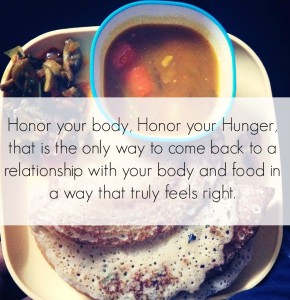Even as a young girl, intuitively I hated going on diets. It didn’t feel normal to me that I needed to restrict the way I ate but my friends didn’t; that some of them could eat whatever they wanted and not gain any weight, whereas I ended up eating the most benign of foods and ended up gained weight. That doesn’t mean I didn’t go on a diet. When I was around 18years I had stopped eating anything after lunch for months together and lost almost 10kgs only to gain it all back when I began to eat all three meals.
Today, kids who are thirteen are enrolled in diet programs because they are morbidly obese and their GPs have asked them to lose weight or experience conditions like thyroid, PCOD, and Diabetes. In working with these children, here’s what I know- that they feel angry that they are restricted foods they could previously have, they feel sad and awful about their body when they are out with their friends and family and find that their families can and do eat whatever they want but they in fact have to really control themselves in order to look beautiful and be healthy. In working with these kids we have realized that perceiving food as restrictive is the first step to a life long struggle with food and body image.
Studies support our individual experience with food. Studies have shown that chronic dieting teaches the body to retain more fat when you start eating again, chronic dieting slows the rate of weight loss with each successive attempt to diet. We also know today that dieting leads to decrease in our metabolism, it increases our binges and cravings and also causes out to lose our satiety cues. Some of the psychological impact of dieting includes the fact that dieters were eight times more likely to suffer from an eating disorder. Dieting also correlated with feelings of failure, lowered self-esteem and social anxiety. Dieters are often vulnerable to loss of control on eating when violating the “rules” of the diet (Evenlyn Tribole and Elyse Resch, 2012).
Now, some of us outwardly put it out there that we are on a diet. Many of us however pseudo-diet, practices such as eating only at certain times of day, carefully avoiding certain foods even if they are your favorite foods, paying penance for eating “bad”foods like ice cream etc by skipping meals, and generally cutting back on food based on what we “think” is right for us are all ways that people continue to restrict and overeat.
A classic study done by Dr. Ancel Keys during the World War II goes like this: 32 healthy men were selected for their “superior mental and physical health”. In the first three months of the study these men ate whatever they wanted and it averaged at 3,493 calories. The next 6 months was the semi-starvation period, these men were required to lose 19-28 percent of their weight depending on their body composition. Their calories were cut to a half averaging 1,570 per day. The effects of this study demonstrate some startling findings that appear to mirror the behaviour of today’s dieter. Some of them were:
- The men’s metabolic rate decreased by 40%
- These men were obsessed with food, they found themselves craving food and talking about food and even gathering a variety of recipes.
- Their style of eating completely changed to ravenous hunger while some even dawdled with their good for hours.
- They found themselves having no “will power” and that they were binging often.
- Personalities and moods changed drastically.
There is so much that can be gleaned from this study. In a time where there were no television and media to influence perceptions of food, these men were constantly thinking about food, overeating and obsessing about food, much like today’s dieter no?
As mentioned in the previous post, when we begin to diet, our bodies think that we are putting ourselves in a famine situation and this in itself is a recipe for weight gain and unhealthy living.
Another interesting fact is that while we so badly control ourselves from carbs and fat these very ingredients are the brains source of food and energy. The brain’s chemical Neuropeptide Y is responsible for human eating behaviour and impacts both the size and duration of carb-rich meals we need in our body and brain. Therefore we might find that we are in fact losing weight when we diet but what is really happening in the absence of carbs and fat in our body is that our body is taking away the protein rich muscles and converting it into glucose, another unhealthy path to what is known as yo-yo dieting.
All this boils down to what? Honor your body, honor your hunger. That is the only way to come back to a relationship with your body and food in a way that truly feels right.
My next post will talk about what researchers and experts demonstrate as effect way to honor our body and hunger. In the meanwhile though, share with me here, or over our Mindful Eating Online Group, what is your experience of being on a diet? What does hunger feel like in your body?
Also, If you are in Hyderabad, India come on over to our two-day long Mindful Eating Workshop at Our Sacred Space on September 12th and 13th 2015, where will deepen our practices in mindful eating.

